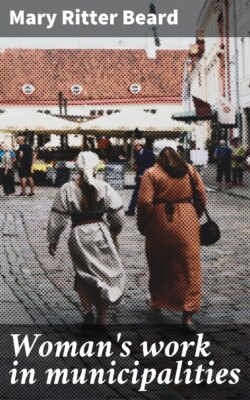Читать книгу Woman's work in municipalities - Mary Ritter Beard - Страница 16
Family Visitation
ОглавлениеAs in other branches of social endeavor, we see public health work tending more and more toward prevention. The ideal now is not merely to provide more ambulances, but rather to reduce the necessity for so many ambulances. This need early became apparent as hospitals discharged patients only to find them soon fallen into sickness again.
In all varieties of hospitals where the poor are admitted as patients, the follow-up treatment is often as vital as the immediate prescription and nursing. This involves family visitation and advice and is called by Miss Katherine Tucker, president of the New York Association of Hospital Social Service Workers, “a new profession.” Miss Ida M. Cannon, headworker of the Social Service Department of the Massachusetts General Hospital, puts these pertinent questions about the social work of hospitals:
OF WHAT USE IS IT—
If a patient for whom the surgeon orders a back brace starves herself to pay the bill?
If a workman, cured of rheumatism, goes back to his job in the damp cellar which caused it?
If a clerk, fitted to glasses, returns to the dim desk which crippled her sight?
If an unmarried girl, delivered of her child, goes from the maternity ward back to the neighborhood that ruined her?
Medicine and surgery, supplemented by social service, not only cure disease but restore to full health and working capacity.
The theory and practice of this youngest handmaiden of medical science are fully, simply and interestingly told in the latest Russell Sage Foundation Publication.
Dr. Richard Cabot, of Boston, was one of the first physicians to emphasize the social background of health; but it is admitted on all sides that women are proper persons to treat the family and discover its needs. They are social physicians in a very real sense and their knowledge must be industrial, economic, psychological, as well as medical.
At the fifteenth annual convention of the American Hospital Association held in Boston last summer (1914), Dr. Frederick Washburn, president of the association, insisted that the function of the hospital is not merely to treat patients acutely sick, but to aid in the prevention of disease, and to undertake social service and coöperation with community agencies. Other speakers dwelt on the necessity of better care of the “out-patient,” the social service side of health work. The Survey had this to say: “A new note was struck by Elizabeth V. H. Richards, headworker of the social service department of the Boston Dispensary, who showed that the social service department is not only of assistance to individual patients, but that the medical social worker can be of value to the managing authorities of the institution as a whole, in studying the efficiency of its clinical work, and in planning the broader relations which its work may bear to other welfare resources in the community.”
The home situation clearly has to be considered as well as the physical ailment in almost every case requiring medical care. Thus the task is a coöperative one between the social worker and the medical scientist. Every attempt to improve labor and living conditions is a similar aid to medical science if not to the medical profession, so that any proper study of health or physical well-being must lead us on to an examination of efforts for better housing, a living wage, for social insurance, for workmen’s compensation, and the many other devices that make a decent standard of living possible.
After-care is especially imperative in cases of mental disorder. Patients may be discharged from insane hospitals in some cases if the physician can trust in the home environment. The social worker is his aid in these cases and thus helps to keep families together. The prevention of insanity and the after-care of patients is the object of the National Committee for Mental Hygiene which numbers Julia Lathrop, Jane Addams, Mrs. Philip Moore and several other women among its members. Dr. Thomas Salmon, a leader in this work, writes: “Women are active in this committee and I can say that we rely very much upon the wise counsel of these members of the committee.”
